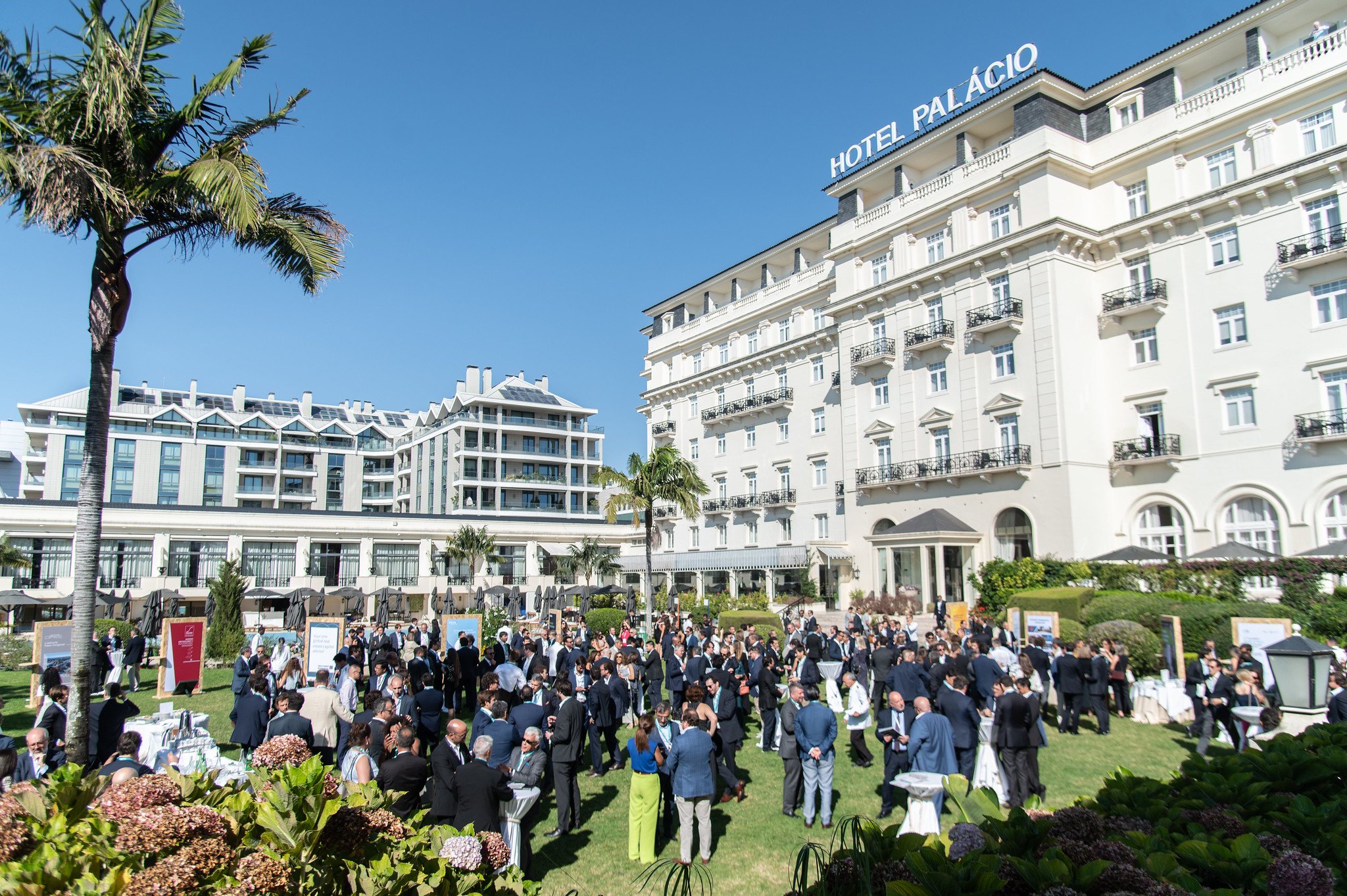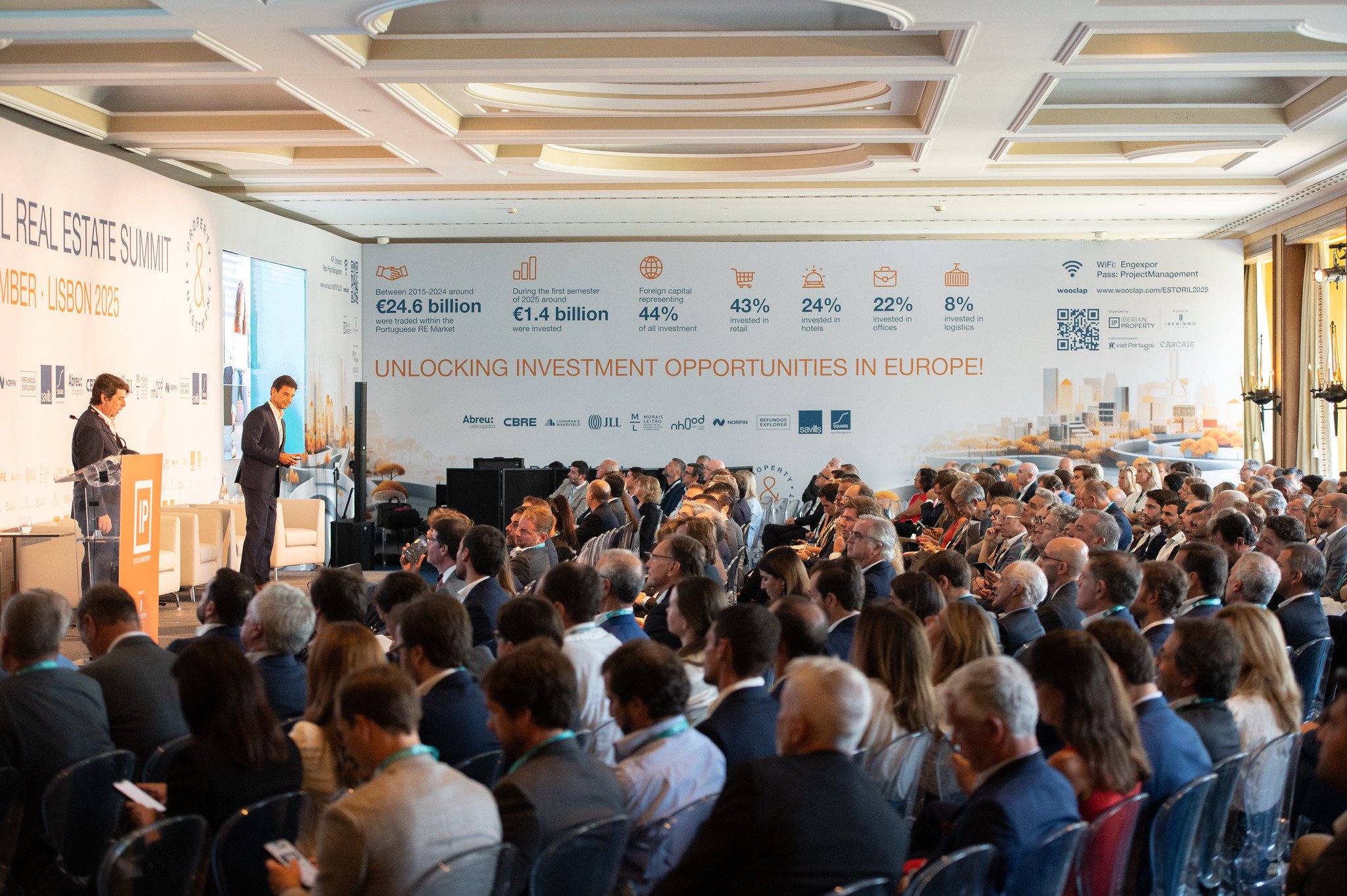PORTUGAL REMAINS A “BUY” MARKET, BUT LONG-TERM SUCCESS DEPENDS ON DELIVERY AND TRUST

Portugal Real Estate Summit - 2025.
On the 15th and 16th of September, Iberian Property brought to Estoril the 9th edition of the Portugal Real Estate Summit, where the global property sector was well represented by more than 400 industry leaders from over 20 countries, keeping the tradition of having a sold-out edition.
With a fresh economic perspective, the Portugal Real Estate Summit kicked-off by the hand of the Former Deputy Minister and Minister of Foreign Affairs, Paulo Portas, who underlined from the start that, despite global turbulence, real estate remains decisive for Portugal. The country’s main challenge, he argued, is not lack of demand but two decades of insufficient supply.

Access all the presentations of the Portugal Real Estate Summit 2025:
CBRE + Savills | C&W + JLL | Caixa Geral Depósitos | Parque Cidades do Tejo
Turning to geopolitics, Paulo Portas commented that the world is shifting from a system of alliances to one dominated by power politics. He noted that Russia, often treated as a superpower, only excels in nuclear capacity, while its economy does not even rank among the global top ten. He recalled how the US once hoped to decouple Russia from China, but instead created unease across the Northern Hemisphere, with even the transatlantic alliance diverging on Ukraine. Against this backdrop, he argued that Europe must recognize contradictions between geopolitics and geoeconomics: while China is slowing, India is rising, soon to overtake Germany, yet tariffs and mistrust have undermined Western unity.
On security, Paulo Portas reminded the audience that NATO’s 2% defence target, once ignored, is now met by 31 members. He highlighted Poland’s 4.2% of GDP as proof that proximity to conflict shapes priorities, and pointed to Germany’s €500 billion U-turn as a historic shift. For Europe, he insisted, the illusion of “peace without defence” has ended. If Putin only respects strength, Europe must consolidate its fragmented defence industry and act together, while Portugal has already taken small but symbolic steps, such as selling drones to France.
How can we invest more in defence without cutting welfare? The answer is growth—Europe’s most critical economic challenge.
Demographics were another pressing theme. With Portugal’s average age at 47—the second-oldest in Europe—Paulo Portas argued that reversing decline requires a consistent mix of housing, tax, labour, and migration policies over decades. Zero migration, he warned, is unrealistic: construction, tourism, and logistics would collapse without foreign workers. What matters is regulation, ensuring migration strengthens rather than destabilises societies.
Shifting to the economy, Paulo Portas contrasted Portugal with Europe’s larger economies. While Germany, France, and Italy struggle with structural or debt crises, Portugal has cut its debt from 138% of GDP to around 88%, below the EU average. “This is not optimism, but comparison,” he stressed, citing upgrades from Moody’s, Fitch, and S&P, and growth above the Eurozone average—2.3% in 2023 compared to just 0.5–0.8% across the bloc.
For investors, Paulo Portas concluded, Portugal offers rare qualities: political consensus on fiscal discipline, resilience in global headwinds, and a clear need for new housing and infrastructure. “When real estate grows, the economy grows,” he said, calling on the sector to seize the moment while the country remains a safe, stable, and competitive destination for capital.

OFFICIAL PHOTO GALLERY
Access all the photos of the Portugal Real Estate Summit 2025Portugal is no longer a “hidden gem” but a consolidated global tourism market.
In a joint presentation by two consultants, the afternoon delved in the relationship between tourism and real estate.
As Duarte Morais Santos of CBRE underlined, 2025 is set to become yet another record year, with lodging revenues surpassing €6.7 billion, a remarkable +10.6% year-on-year increase and almost double the 2014 level. Over the last decade, the sector has shown not only resilience but also growing profitability, attracting investors eager to ride the country’s tourism wave.
Paula Sequeira of Savills complemented this view by stressing the fundamentals: in just ten years, the total number of guests in Portugal has soared from 12 million to more than 31 million, with international visitors growing by +105%. Performance metrics followed suit—ADR up 35%, RevPAR up 41%—while occupancy has consistently hovered in the mid-60s. “These are the kind of figures that explain why Portugal has moved to the top tier of European hotel investment destinations,” she noted, referencing CBRE’s survey that now ranks Portugal among the most attractive markets for global capital.
Both experts pointed out that growth has not been confined to Lisbon and Porto. Regions such as the Azores and Madeira posted income growth of +97% and +87% between 2019 and 2024, proving that new destinations are unlocking investment opportunities. Meanwhile, hotel investment volumes have averaged €454 million per year over the last decade, with more than 80% directed to upscale and luxury assets, consolidating Portugal’s move upmarket.
Looking ahead, the CBRE and Savills representatives agreed that challenges remain—airport capacity, licensing delays, and the need to balance development with community impact. “The golden marriage of tourism and real estate is not ending,” Paula Sequeira concluded, “it is simply entering a new era.”

“Overtourism is not our immediate challenge - Infrastructure is.”
Moderated by Richard Betts, Co-Founder at Real Asset Media, the roundtable that followed brought together five leading investors and operators to discuss the future of Portuguese tourism and its deep ties with real estate. From the outset, there was consensus that Portugal has moved from a peripheral player to a prime destination for capital and innovation—but the debate quickly showed the nuances of how to sustain growth without falling into the traps of over-tourism or overheated pricing.
Elizabeth Rothfield, Founding Partner & CEO of Explorer Investments, set the scene by recalling how her firm entered hospitality “almost by accident” 13 years ago, taking over distressed assets from banks. Since then, Explorer has become the fourth-largest hotel manager in Portugal by number of units, spearheading a repositioning of the sector. She noted that “Portugal was once labelled a pig economy, but macroeconomic discipline, combined with programs like Golden Visa and non-dom regimes, gave the country outsized visibility.” The real challenge now, she argued, is continuing to upgrade quality and services, shifting from the “cheap and cheerful” Algarve model towards luxury and experience-based hospitality.
Picking up on this point, José Roquette, Chief Development Officer at Pestana, underlined that the group now operates 110 hotels across 16 countries with a staff of 5,000. “After a decade of intense growth and coming out of COVID stronger, we are ready for the next stage,” he said. Pestana’s strategy focuses on major European cities and the US, with branded residences increasingly part of the mix. For Roquette, Portugal’s capital cities still have room to grow: “Lisbon and Porto need to move from the Europa League to the Champions League. We are still well behind the top capitals.” Yet he also sounded a note of caution: “There is an elephant in the room called over-tourism—we cannot ignore its impact.”

Daniel von Barloewen, SVP Global Mixed-Use Development at Accor One Living, highlighted Portugal’s fit with global branded living trends. He clarified a frequent misconception: “A true branded residence is owned real estate, branded, operated, and serviced to the standards of a hospitality company. That’s very different from serviced apartments.” According to him, demand is being driven by lifestyle, community, and hassle-free ownership—“living in your own hotel suite.” With 180 branded residence projects in the pipeline, Accor sees Portugal as fertile ground, provided regulation and infrastructure keep pace.
John Calvao, Partner at Arrow Global, stressed scale and ecosystem development. Managing €120 billion across Europe and employing 3,000 people in Portugal, Arrow focuses not on “one-off hotels” but on building destinations. “In Vilamoura, Palmares, Tróia—we are effectively creating small cities, with schools, hospitals, golf courses, housing, and hotels. That’s what builds long-term value,” he explained. He also pointed to diversification: Arrow invests in affordable housing, student housing, and senior living. “Portugal is small, so we have to go wide. But the opportunity is to sell not just homes, but destinations and lifestyles.”
Javier Arús, Senior Partner at Azora, countered Roquette’s Champions League analogy with a smile: “I would say Portugal is already playing in the Champions League in terms of attractiveness. There is no risk premium here compared with other European markets.” What makes Portugal stand out, he argued, is stability—“in tax, in labor law, in institutions. Investors know where they stand.” That said, he called for faster licensing and cheaper construction costs, noting that “Lisbon is among the most expensive cities to transform in relative terms.”
While travel demand has grown nearly 5% annually, hotel supply in the Mediterranean has expanded less than 1%. The pressure comes from alternative lodging, not hotels.
The discussion turned inevitably to the question of over-tourism. Roquette warned that regions like the Algarve and Madeira need stronger planning and that touristic taxes should be clearly reinvested in community projects. Von Barloewen added that broader infrastructure—schools, healthcare, regulation of short-term rentals—was key to preventing saturation. Drawing on examples from Dubai and Barcelona, he stressed the importance of “tight but confidence-building regulation.” Calvao, however, pushed back: “We’re worried about the wrong problem. Lisbon Airport is full, Faro is full—you can’t even bring in more visitors without fixing infrastructure first. Over-tourism is not our immediate challenge.” Arús brought numbers: while travel demand has grown nearly 5% annually, hotel supply in the Mediterranean has expanded less than 1%. “The pressure comes from alternative lodging, not hotels,” he argued, highlighting that in Madrid only 9% of Airbnb listings are licensed. Rothfield agreed that infrastructure—from airports to passport control—must be addressed, but she also pointed to the vast untapped potential of underexplored regions like the Douro or Portugal’s interior.
When it came to opportunities, the panel converged on hospitality and repositioning. Rothfield emphasized luxury upgrades and boutique concepts: “We like getting our hands dirty with CapEx. Paybacks are quick and profitable.” Her firm’s Octant Hotels are an example of smaller assets scaled up into a brand. Roquette confirmed Pestana’s continued commitment to hotels and branded residences, though warning that “entry pricing is becoming challenging—newcomers are sometimes overpaying.” Calvao broadened the scope, pointing to student and senior living as sectors with strong fundamentals. Arús reaffirmed long-term confidence: “Tourism is 20% of Portugal’s GDP. You cannot put this industry at risk. Fundamentals are very solid.”
In closing, the mood was unmistakably bullish. All panelists agreed Portugal remains a buy market for tourism-related real estate. The consensus was that while risks around infrastructure and community integration must be managed, the fundamentals—stability, quality of life, macro discipline, and rising global profile—make Portugal one of Europe’s most attractive investment destinations.

Great Wines & Financing bright perspective
The Networking Dinner of the Portugal Real Estate Summit welcomed Paulo de Moita Macedo, CEO of Caixa Geral de Depósitos, who addressed a room full of senior international investors with a candid outlook on Portugal’s economic and real estate fundamentals. Stressing that “we are not living a time of change, but a change of era,” he pointed to the resilience of the Portuguese economy: the country ranked among Europe’s top 10 destinations for FDI, with 84% of surveyed investors planning to expand operations in 2024—well above the 72% European average.
For real estate specifically, Paulo Moita de Macedo highlighted financing momentum and sector trends. In the first half of 2025 alone, €10.8 billion in new real estate loans were issued, up €3.2 billion from the same period in 2024, supported by falling mortgage rates, now averaging 2.91%. He also underlined sustainability and governance as defining forces, noting Caixa’s own progress in cutting financed emissions and its active role in backing hotels, infrastructure, residential, and retail. His message to investors was clear: Portugal combines attractive returns with long-term stability, but success will depend on maintaining competitiveness, scaling housing supply, and reinforcing trust between public and private stakeholders.

Day 2 - Portugal Real Estate Summit 2025.
Day two of the Summit once again offered participants the chance to engage in interactive breakout sessions, building on the success of the first afternoon. Six parallel discussions allowed delegates to share views and explore specific themes in depth: Alternative Real Estate Financing chaired by Abreu Advogados; Redefining Hospitality led by CBRE Portugal and Neoturis; Key Insights for Forward-Thinking Landlords hosted by Cushman & Wakefield; Shopping Centres as Undervalued Champions guided by JLL Portugal; Regulated Real Estate Investments steered by CMVM and Morais Leitão; and Luxury Housing in Portugal moderated by Savills Portugal. These sessions, combining expertise from leading firms with active investor participation, enriched the Summit’s collaborative spirit.
Also similar to the first day, two consultants shared the stage to share the most pressing indicators with the audience. Paulo Sarmento, Head of Transactional Services Portugal at Cushman & Wakefield, opened by noting that 2024 was a strong year for investment in Portugal. Retail dominated activity, with strong appetite in high street and tourism-related assets pushing yields down. “We are securing good returns and compare well with other European markets,” he stressed.
Augusto Lobo, Head of Capital Markets (CRE) at JLL Portugal, agreed, adding that shopping centres and high street retail are seeing strong rent growth and near-full occupancy. “If we had more shopping centers, we would most likely have more transactions, and thus a higher share of retail in terms of total investment volume”, underlining that demand exceeds supply. Iberia, he reminded, was the top retail investment destination in continental Europe.
Turning to living sectors, Paulo Sarmento pointed to PBSA as the “rising star,” with international student numbers surging. “There is still plenty of room for growth,” he argued, while senior living remains underrepresented despite clear demographic drivers. Lobo added that multifamily and Build-to-Rent hold “great potential given the imbalance between supply and demand.”
In offices, both consultants stressed strong fundamentals but limited availability. “Rents have risen by 45% in Lisbon and 24% in Porto since 2018, yet Grade A supply remains scarce,” Lobo observed, predicting continued pressure on prime stock. Offices, he added, increasingly resemble hospitality, with service and user experience at the core.
Logistics is another area where Portugal lags in supply. 87% of pipeline projects are already pre-leased, underscoring intense occupier demand. Data centres, meanwhile, were described as the “new kid on the block”: Portugal combines location, security, stability, and great access to green energy sources, making it a future hotspot.
Both concluded that Portugal’s fundamentals are robust, but scaling depends on easing regulatory bottlenecks and delivering more quality stock. “The capital is there, what we need is product.”

“Housing dominates financing, particularly Build-to-Sell.”
Moderated by Richard Betts, the investor roundtable that followed brought together leading voices from capital, development, and banking to reflect on where the best opportunities lie in Portugal’s real estate market, and what obstacles still stand in the way of scaling projects.
From the outset, Vanessa Gelado, Senior Managing Director and Head of Spain & Portugal at Hines, made clear that the company’s focus is firmly on living sectors, particularly purpose-built student accommodation (PBSA). Yet she acknowledged financing challenges: “PBSA is still harder to finance than Build-to-Rent, but if the assets are strong and cash flows assured, it remains a good time to invest.”
Frédéric Jariel, Co-Head of Real Estate at Tikehau Capital, picked up the Build-to-Rent theme, calling it “a good asset class” for Portugal’s next growth phase. However, he warned that “Build-to-Sell is BTR’s biggest enemy,” still capturing the bulk of capital and investor attention. Offices, he added, can also be attractive, provided they are in the right locations and aligned with new workplace expectations.
For Juan M. Acosta, Chief Investment Officer at Rockfield Real Estate, the real opportunity lies in flexible living formats. “We are getting older, we need more housing, and it has to be more affordable. Investors will follow those structural needs,” he argued. Flex-living and coliving, halfway between student housing and conventional residential, could bridge the gap. Yet he cautioned that regulation and delivery times remain major hurdles, particularly in inner cities like Lisbon and Porto.

Duarte Soares Franco, Board Member at Habitat Invest, offered a developer’s perspective, insisting that “we sell lifestyle.” His company continues to back Build-to-Sell and hospitality projects, while preparing to launch a new line of touristic apartments. But he did not shy away from pointing out difficulties: construction costs have risen significantly, and “regulations are complex and slow—we need much more flexibility.”
Representing the banking side, Francisco Ravara Cary, Executive Board Member at Caixa Geral de Depósitos, stressed that “housing dominates financing, particularly Build-to-Sell.” While the bank also supports tourism projects and some offices, its conservative approach remains rooted in the residential market. “We can provide large amounts of financing at competitive rates,” he said, noting that ESG-aligned projects can sometimes secure lower financing costs. Still, he admitted that slow licensing processes push up costs and weigh on appetite.
As the conversation turned toward Portugal’s position in the wider European context, Gelado argued that both Portugal and Spain should aspire to become long-term staples of institutional and private investor portfolios, rather than tactical plays. “There has not been a better time in the past 15 years to raise equity for Iberia,” she said, but channeling that capital requires competitive pricing and compelling narratives in investment committees.
Soares Franco agreed on the growth story but warned against complacency: while southern Europe now looks attractive, northern markets are opening new windows of opportunity. “Yes, Portugal no longer needs explaining—the growth is evident—but we must avoid overpaying,” he cautioned.
In closing, the consensus was that Portugal remains firmly a “buy” market for 2025/26, with living and hospitality leading the pack. But the discussion also revealed clear dividing lines: while developers and investors see promise in PBSA, BTR, and flexible living, banks still anchor financing in traditional Build-to-Sell. The sector’s future will depend on whether regulatory reforms and financing models can evolve quickly enough to match investor appetite.
“Lisbon’s expansion into a second city is inevitable”
Lisbon is on the verge of a historic transformation. With 2.9 million residents, Greater Lisbon is already Europe’s 11th largest urban area—but with the Parque Cidades do Tejo vision it will climb into the top 10. At the heart of this plan lies the creation of a two-shore metropolis, linking the north and south banks of the Tagus with four crossings instead of today’s two.
The South Bank—Almada, Seixal, and Barreiro—will host the new international airport and a high-speed rail hub connecting Lisbon to Porto and Spain. This will inevitably shift the city’s growth axis, with projections that the South Bank could become Portugal’s third-largest city within 30 years.
Ambitious flagship projects are already outlined: an Ocean Campus on the north bank to activate the waterfront, and long-term airport-linked developments set to transform mobility, housing, and investment. As António Ramalho, Chairman at Lusoponte, stressed in his keynote speech during the Summit: “This is not a wish—it is inevitable. Lisbon will become a city on two banks.”

Moderated by António Gil Machado, Partner at Grupo Iberinmo, the last roundtable of the event addressed one unavoidable theme: scale. The Parque Cidades do Tejo vision, with its new airport, high-speed rail, and river crossings, is nothing short of transformative. The panelists agreed that the ambition is both necessary and overdue.
Cristina Santos, Executive Director of Property Management & Leasing at Sonae Sierra, stressed that the plan comes “already late” given Lisbon’s housing shortage and mobility challenges. For her, the decisive factor is not only the ambition but also the ability to integrate housing, climate resilience, and governance mechanisms over the long horizon of a 10–15 year project. “This is 55 times the scale of Expo,” she reminded, “so it needs dynamic governance and private investor input to ensure flexibility as needs evolve.”
Miguel Santana, Board Member at Fidelidade Property, took a more personal angle. He underlined his belief that Lisbon’s south bank expansion is inevitable. “We need to go for it,” he argued, calling infrastructures like the third Tagus crossing “mandatory.” Without them, he warned, international capital will hesitate. He also highlighted his personal connection to Almada, suggesting that Margueira could be a natural starting point: close to Lisbon and ready for visible impact.
Pedro Coelho, CEO of Square Asset Management, added historical perspective, comparing today’s challenge with Expo 1998. Then, as now, public will, zoning clarity, and fast licensing were the keys. “If those KPIs align, investors will follow,” he said, pointing out that Square remains location-agnostic: wherever there is demand and long leases, capital will deploy. Coelho also emphasized that infrastructure must move first—airport, bridge, and rail—to unlock private momentum.
The new airport and high-speed rail are the true game changers: “They will unlock the potential of the south bank and mitigate Lisbon’s current housing constraints.”
From the advisory side, Alberto Henriques, Associate Partner at Deloitte, underlined that trust will be decisive. “Stability, predictability, transparency, and governance are the words that matter,” he said, stressing that multidisciplinary teams and clear KPIs must guide the process. For him, the new airport and high-speed rail are the true game changers: “They will unlock the potential of the south bank and mitigate Lisbon’s current housing constraints.”
Returning to the role of private capital, Cristina Santos insisted that investors must not just be financiers, but partners in shaping sustainability, community integration, and technological adaptation over decades. “Otherwise we risk building new centralities that don’t match the needs of future generations,” she warned.
Miguel Santana echoed this by noting that institutional investors like Fidelidade are already integrating infrastructure into their long-term vision. “We are talking about Lisbon’s expansion into its second city. We will need to commit time, effort, and capital, but the opportunity is too important to ignore,” he said.
The discussion also circled back to sequencing. Pedro Coelho and Alberto Henriques agreed that the airport and high-speed rail must come first, acting as catalysts for south bank development. Once mobility is unlocked, other projects—from Margueira to Barreiro—will follow. Cristina Santos pointed to Sonae Sierra’s own investment in Barreiro as evidence that private capital is already positioning itself for this shift.
As the debate closed, the last shared idea was the following: Lisbon’s two-shore transformation is inevitable. But its success will depend on delivering infrastructure early, embedding governance and sustainability, and ensuring public and private sectors move in lockstep. As Alberto Henriques concluded, “Public vision without private trust cannot succeed—but together, Lisbon can become a true metropolitan hub on the European stage.”

The Summit concluded with a meaningful initiative led by WIRE Portugal and Iberian Property, uniting art, investment, and social purpose. A vibrant painting by renowned artist Margarida Fleming was auctioned among participants, with proceeds directed to Associação Vilacomvida / Café Joyeux, a pioneering project that empowers young adults with intellectual and developmental difficulties through training and employment. The initiative left a lasting mark, combining cultural appreciation with positive social impact and reinforcing the sector’s commitment to inclusion and equality.
Acknowledging Our Partners and Supporters
This Summit would not be possible without the trust and commitment of our partners. Our deepest thanks go to CBRE, Cushman & Wakefield, JLL, and Savills, whose longstanding support remains at the core of this Conference. We are equally grateful to Portugal’s leading investment houses—Square AM, Refundos Explorer, Norfin, Fidelidade, Nhood, Sonae Sierra, GNB Fundos, Habitat Invest, and Merlin Properties—for their continued confidence.
We also acknowledge the invaluable contribution of Deloitte, Abreu Advogados, Morais Leitão, and Engexpor, whose market knowledge enriches our debate. A special note this year to Caixa Geral de Depósitos, joining us for the first time as Dinner Sponsor, and to Turismo de Portugal and the Cascais Tourism Office, whose partnership reinforces the international reach of this initiative.

